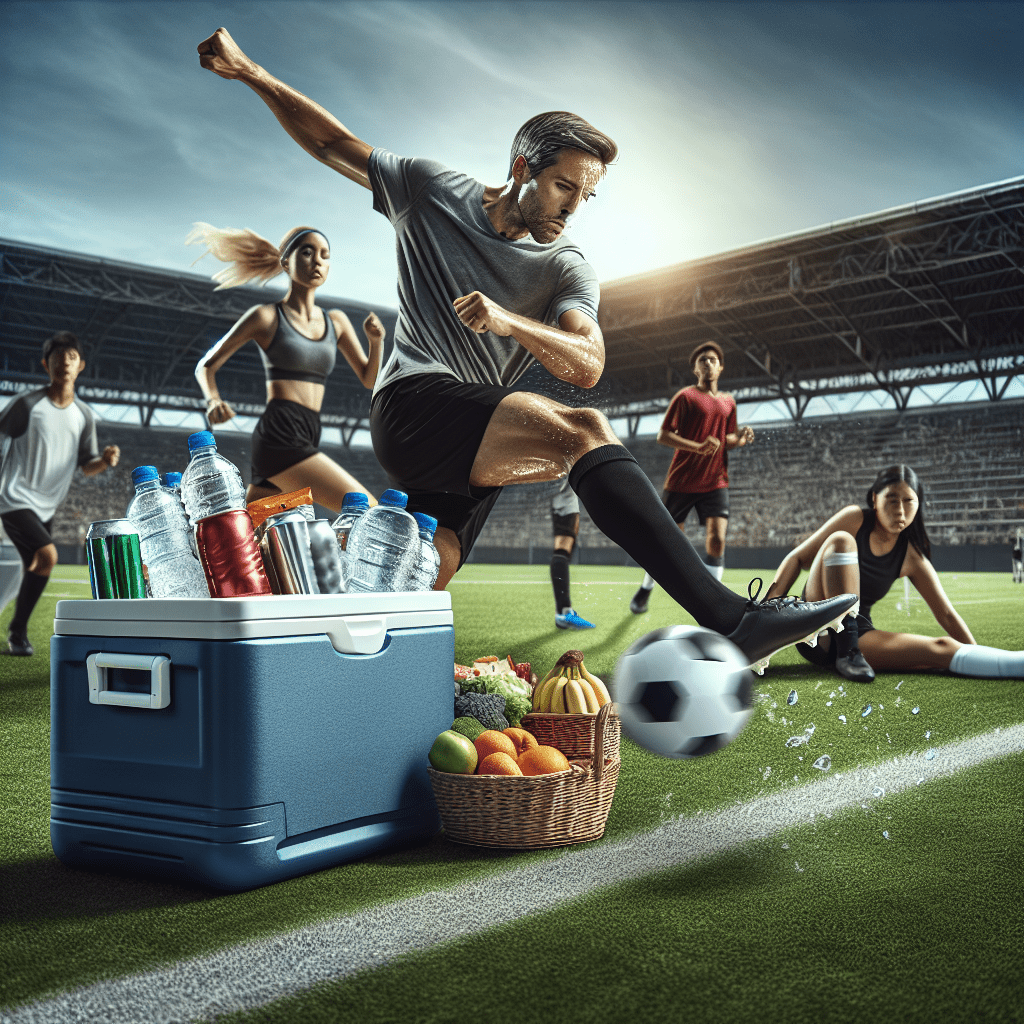[ad_1]
**Beyond Hydration: Nutritional Strategies for Soccer Performance Enhancement**
Soccer is a high-intensity sport that demands not only skill and strategy but also optimal physical conditioning. While hydration is a critical factor in maintaining performance on the field, focusing solely on fluid intake overlooks the comprehensive nutritional strategies that can significantly enhance a player’s game. This article delves into the pivotal role of nutrition in soccer performance, exploring how a well-designed diet can improve energy levels, speed up recovery, and boost overall athletic capabilities.
**Fueling Performance: The Importance of Energy**
Energy provision is foundational for soccer players, given the sport’s demands for endurance, speed, and quick recovery. Carbohydrates are the primary energy source for high-intensity activities, making up a significant portion of an athlete’s diet. However, the type of carbohydrates matters. Complex carbs found in whole grains, vegetables, and fruits provide a slow and steady release of energy, while simple carbs offer quick energy bursts.
**Protein: Building and Repairing Muscle**
Protein plays a crucial role in muscle repair and growth. After a hard game or training session, muscle fibers need repair, and consuming adequate protein helps in this recovery process. Incorporating lean proteins like chicken, fish, and plant-based alternatives such as lentils and tofu can help maintain and build the muscle mass required for a soccer player’s explosive power and strength.
**Fats: The Overlooked Nutrient**
Often misunderstood, fats are an essential part of a soccer player’s diet, especially for long-lasting energy. While it’s important to choose the right type of fat, incorporating sources of unsaturated fats like avocados, nuts, and olive oil can provide sustained energy, aid in recovery, and support overall health.
**Hydration: Beyond Water**
While water is crucial, hydration strategies should also consider the loss of electrolytes, primarily sodium, which occurs through sweat. Integrating electrolyte-rich drinks or snacks post-training or matches can help maintain fluid balance, supporting overall performance and recovery.
**Timing Matters: Nutrient Timing for Optimal Performance**
Pre-game Nutrition: Consuming a meal rich in complex carbohydrates 3-4 hours before a game can ensure a stored energy reserve, ready to be utilized as the game progresses. Adding a moderate amount of protein and low-fat content can also aid in sustaining energy levels without causing discomfort.
Halftime Fuel: Halftime provides an opportunity to replenish energy stores with easy-to-digest carbohydrate-rich snacks. This can help maintain performance levels through the second half without weighing down the player.
Post-game Recovery: Within the golden 30 minutes post-game, consuming a mix of carbohydrates and protein can significantly enhance recovery. This window is when muscles are most receptive to nutrient uptake, paving the way for effective muscle repair and glycogen replenishment.
**Supplementation: Aiding Performance through Supplements**
While a well-rounded diet should always be the priority, certain supplements can offer benefits. Creatine, for example, can improve high-intensity performance and aid in recovery. Beta-alanine can enhance buffering capacity in muscles, slightly improving endurance. However, it’s crucial to approach supplementation with caution, prioritizing safety and compliance with anti-doping regulations.
**Personalizing Nutrition: The Key to Success**
Recognizing that every player’s body and position on the field require different nutritional strategies is critical. Forwards may need more focus on carbohydrates for quick sprints, while midfielders might benefit from endurance-focused nutrition plans. Personalizing nutrition plans can cater to these specific needs, enhancing individual and team performance.
**Common Questions About Soccer Nutrition**
*What should a soccer player eat before a game?*
A balanced meal of complex carbohydrates, moderate protein, and low fat 3-4 hours before a game can provide sustained energy. Examples include whole-grain pasta with lean meat and vegetables or a quinoa salad with grilled chicken.
*How much water should a soccer player drink?*
Hydration needs can vary, but a general guideline is to drink at least 3 liters of water daily, increasing intake on training and match days. Monitoring urine color can also help assess hydration status; aim for a pale straw color.
*Can a vegan diet support a soccer player’s nutritional needs?*
Yes, a well-planned vegan diet can support a soccer player’s performance. Key considerations include ensuring adequate protein intake from diverse plant sources and possibly supplementing nutrients like vitamin B12, iron, and omega-3 fatty acids.
*How do I know if I’m consuming enough nutrients?*
Consulting with a sports dietitian can provide personalized nutritional guidance. Keeping a food diary and monitoring performance and recovery can also offer insights into whether nutritional needs are being met.
In conclusion, optimizing nutrition for soccer goes beyond mere hydration. A comprehensive approach, emphasizing proper macronutrient balance, nutrient timing, and individualized plans, can significantly elevate a player’s performance. By adopting these strategies, soccer players can step onto the field with confidence, knowing their bodies are fueled for peak performance. As the understanding of sports nutrition evolves, so too will the strategies for harnessing its power, promising even greater achievements in the beautiful game.
[ad_2]






